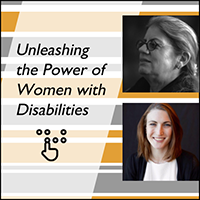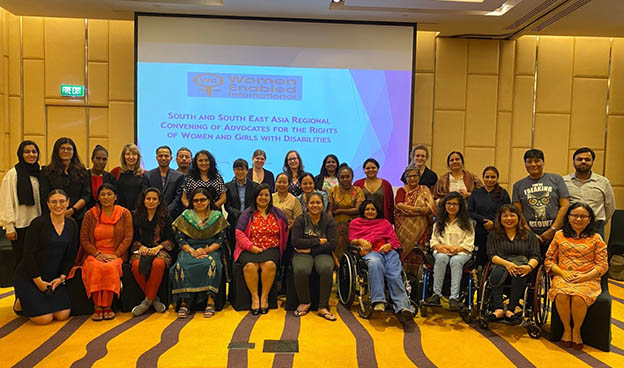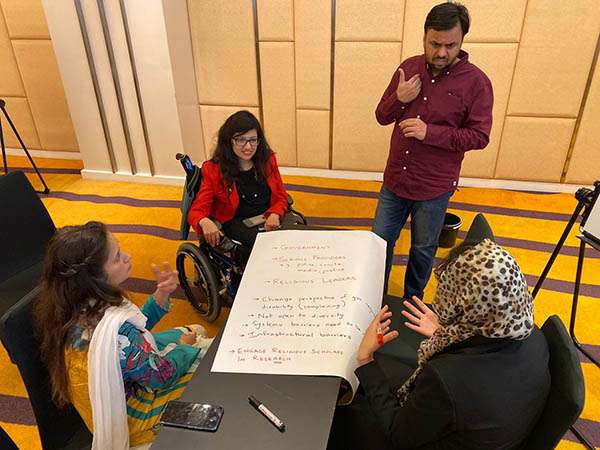Unleashing the Power of Women with Disabilities

![]()
By Stephanie Ortoleva, Executive Director, and Anastasia Holoboff, Senior Legal Advisor, Women Enabled International
Did you know that there are more than half a billion women with disabilities worldwide? That represents both an amazing source of untapped power and millions of women currently left behind. Empowering and engaging women with disabilities is essential to the solution.
 Image Description: Photo of the Convening participants, interpreters and personal assistants.
Image Description: Photo of the Convening participants, interpreters and personal assistants.Across the world, women with disabilities are often excluded from the development of and access to rights-based health policy and programs, particularly relating to sexual and reproductive health (SRH) and gender-based violence (GBV) services and programs. Despite stereotypes and attitudes to the contrary, women with disabilities, like all women, demand SRH and GBV services. Here are just a few of the troubling facts:
- Women with disabilities are up to 10 times more likely to experience sexual violence than their non-disabled sisters, and most shelters and other programs are inaccessible to them.
- Between 40%-68% of young women with disabilities will experience sexual violence before age 18.
- 40-50% of gynecologists in the US reported feeling somewhat to completely unprepared to treat adolescents with disabilities.
- Many disabled women and girls are subjected to forced sterilization, forced abortion, and forced contraception without their consent.
And yet most SRH and GBV services are inaccessible to women with all forms of disability. We at Women Enabled International (WEI) know that engaging and supporting women with disabilities to claim and fight for SRH and GBV services is essential to improving access and creating long-term change. That is why we recently hosted our Asia-Pacific Regional Convening of Advocates for the Rights of Women and Girls with Disabilities in Thailand. Building upon the success of WEI’s convenings in Europe, Latin America, and Africa, WEI invited twenty-two women with disabilities from ten countries in the region and allies from the women’s rights movement to come together to strategize and build one another’s’ capacity to engage with national governments and the international and regional human rights systems to advance the rights of women and girls with disabilities in the Asia-Pacific Region.

Image Description: Four people having a conversation around a large sheet of paper where they have been writing their brainstorming ideas. One of the women is speaking sign language and looking at her interpreter who is signing back.
Attendees participated in sessions based upon WEI’s accountABILITY Toolkit, which includes briefing papers on SRH and GBV. Together we shared good practices and brainstormed how to work most effectively as a regional movement. One of the primary themes throughout the week was the scope of SRH and GBV rights violations experienced by women with disabilities across the region and the barriers to accessing quality SRH and GBV services. For example, participants shared stories of forced sterilization, exclusion from local contraceptive programs, and the power of personal narratives to highlight the barriers women with disabilities face. The convening discussed how organizational development, fundraising, and sharing good practices contributes to empowering the disabled women’s rights movement. We concluded by identifying four categories for action: 1) engage in regional forums to push for the rights of women with disabilities; 2) strengthen the regional network of women with disabilities and allies; 3) provide feedback on debates concerning Abortion, Pre-Natal Testing and Disability; and 4) Engage in international women’s rights forums to ensure that the global feminist movement includes women with disabilities.
We know our rights and how to claim them. Now we ask what you are going to do to partner with the powerful disabled women’s rights movement and to dismantle the barriers that exist throughout the health system? We have two ways for you to get started:
- Check out the resources on Women Enabled International’s website to build your and your organization’s capacity for disability inclusion. For example, the Guidelines we produced with UNFPA on inclusive SRH and GBV services and the WEI accountABILITY Toolkit, which includes briefing papers on SRH and GBV legal standards as well as strategies on how disabled women can advocate for our rights at the United Nations.
- Connect with your local group of women with disabilities and ensure that they have access to your programs. Don’t know who they are? Check out our global map of advocates or contact us. We are happy to help.
Together, we can build a more inclusive future where all women and girls with disabilities claim human rights, act in solidarity, and lead self-determined lives. Reach Women Enabled International at [email protected] and engage with us on social media @WomenEnabled.
ABOUT THE AUTHORS
 Stephanie Ortoleva is the Founder and Executive Director of Women Enabled International (WEI), which works at the intersection of women’s rights and disability rights.
Stephanie Ortoleva is the Founder and Executive Director of Women Enabled International (WEI), which works at the intersection of women’s rights and disability rights.
WEI is recognized for providing innovative and groundbreaking resources for disabled women’s rights advocates globally. As a woman with a disability, she brings development, academic, and legal perspectives to her work as well as her personal experience.
Previously, Stephanie was an attorney at the U.S. Department of State, where she was awarded the prestigious Franklin Award for her outstanding work on human rights. Women’s E-News recognized Stephanie as a leader for women’s rights for the 21st Century and Hofstra University School of Law recognized her as an Outstanding Women in Law awardee.
 Anastasia Holoboff is a Senior Legal Advisor at Women Enabled International, where she researched and drafted the innovative UNFPA-WEI publication, Guidelines for Providing Rights-Based and Gender-Responsive Services to Address Gender-Based Violence and Sexual and Reproductive Health and Rights for Women and Young People with Disabilities. Anastasia prepares submissions to U.N. treaty bodies and mechanisms.
Anastasia Holoboff is a Senior Legal Advisor at Women Enabled International, where she researched and drafted the innovative UNFPA-WEI publication, Guidelines for Providing Rights-Based and Gender-Responsive Services to Address Gender-Based Violence and Sexual and Reproductive Health and Rights for Women and Young People with Disabilities. Anastasia prepares submissions to U.N. treaty bodies and mechanisms.
Previously, Anastasia served as a Staff Attorney in the Protection and Advocacy for Individuals with Intellectual and Developmental Disabilities (PADD) program at Disability Rights New York (DRNY), New York State’s Protection and Advocacy system.
At Cardozo School of Law in 2014, she was awarded the Telford Taylor Award for Outstanding Achievement in the fields of Constitutional Law and Human Rights.




Responses